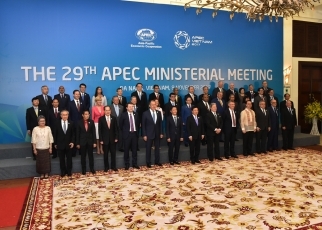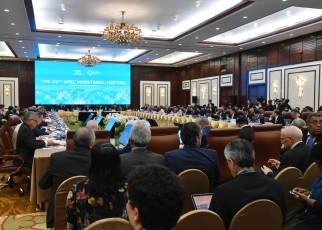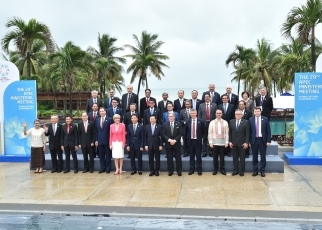Asia-Pacific Economic Cooperation (APEC)
2017 APEC Ministerial Meeting in Da Nang, Viet Nam



The APEC Ministerial Meeting was held on November 8 (Wednesday) in Da Nang, Viet Nam, under the chairmanship of H.E. Mr. Pham Binh Minh, Deputy Prime Minister and Minister of Foreign Affairs of the Socialist Republic of Viet Nam and H.E. Mr. Tran Tuan Anh, Minister of Industry and Trade of the Socialist Republic of Viet Nam, and Mr. Taro Kono, Minister for Foreign Affairs and Mr. Hiroshige Seko, Minister of Economy, Trade and Industry attended representing Japan.
Views regarding a wide range of areas were exchanged in the following three sessions. 2017 APEC Ministerial Meeting Joint Statement was released as an outcome of the meeting.
- 2017 APEC Ministerial Meeting Joint Ministerial Statement (English (PDF)
 / Japanese (PDF)
/ Japanese (PDF) )
)
1. Schedule
| November 8, | Morning | Session 1: State of the Regional and Global Economy and APEC’s Leadership |
| Session 2: New Dynamism for Growth | ||
| Afternoon | Session 3: New Dynamism for Regional Economic Integration |
2. Summary of the Sessions
(1) Session 1: State of the Regional and Global Economy and APEC’s Leadership
A. Discussions were held on subjects such as APEC’s role as a driver of growth and economic integration, a post-2020 vision for APEC.
B. The following is a summary of Japan’s statement.
a. Prosperity and stability in this region can only be achieved through sustainable growth by free and open trade and investment. Japan, as a champion of free trade, will continue to lead our collective efforts to expand a rule-based, free and fair market in the world.
b. Japan wishes to achieve an agreement in principle for the early entry-into-force of the TPP 11 at the upcoming TPP Summit Meeting on November 10. It is our sincere hope that TPP 11 will contribute to establishing the 21st century-rules for free and fair trade and investment. Through such efforts, Japan wishes to advance “the Pathways” to the eventual realization of Free Trade Area of the Asia-Pacific (FTAAP) through TPP and high-quality Regional Comprehensive Economic Partnership (RCEP).
c. APEC should continue to be the driver of liberalization of trade and investment in the region, strive to maintain a strong growth and address new challenges, such as digital trade. These are Japan’s vision for APEC beyond 2020, and Japan is determined to contribute to the goal.
(2) Session 2: New Dynamism for Growth
A. Discussions were held on subjects such as promoting sustanable, innovative and inclusive growth and enhancing food security and sustainable agriculture in response to climate change.
B. The following is a summary of Japan’s statement.
a. There are concerns over widening inequalities due to globalization and innovation. To tackle such concerns, it is important to realize a “virtuous cycle of growth and distribution” through strengthening the competitiveness of Micro, Small and Medium-sized Enterprises (MSMEs), structural reform, energy cooperation, health, women’s empowerment, food security, disaster risk reduction and so on.
b. It is important to strengthen the competitiveness of MSMEs. Japan introduced the “APEC Best Practices for Promoting Supporting Industry” compiled together with Viet Nam.
c. Reforming state-owned enterprises (SOEs) is an important agenda for economic structural reform. Japan appreciates APEC’s work to improve SOEs governance, and Japan stands ready to support this.
d. In order to promote economic growth in the APEC region, it is important to secure access to diverse energy sources. Japan will continue to make a contribution in this area.
e. Promoting “diversity management” including women’s empowerment is also an important challenge. To address this, Japan hosted “APEC Top Management Forum on Diversity Management for Women’s Empowerment”.
f. There are two major challenges in healthcare: establishing a medical system through promotion of Universal Health Coverage (UHC) and addressing the issues of aging society. In this context, Japan will contribute to human resource development in the Asia-Pacific region under “the Asia Health and Human Well-Being Initiative”.
g. Sustainable agriculture is essential for food security. Japan will endeavor to create food value chains in APEC for maximizing value addition to agricultural products.
h. Disaster prevention and risk reduction play a vital role in connecting the region and securing a resilient value chain. Japan will help mitigate the negative impact on economy by large-scale disasters in the APEC region.
(3) Session 3: New Dynamism for Regional Economic Integration
A. Discussions were held on subjects such as deepening regional economic integration, and strengthening MSMEs’ competitiveness and innovation in the digital age.
B. The following is a summary of Japan’s statement.
a. It is important to realize free and fair trade rules by ensuring a level playing field, correcting market distorting measures and removing unfair trade practices.
b. It is important to strengthen the rule based multilateral trading system embodied in the World rade Organization (WTO), and it is necessary to deliver concrete outcomes addressing new challenges including digital trade.
c. Connectivity is essential for facilitating economic integration in the region as well as stability and prosperity of the international community. It is important to develop quality infrastructure in accordance with the international standards. Besides five G7 Ise-Shima Principles for Promoting Quality Infrastructure Investment, Japan will spread the importance of openness and transparency of infrastructure in the region and beyond, contributing to the stability and prosperity of the international community.



